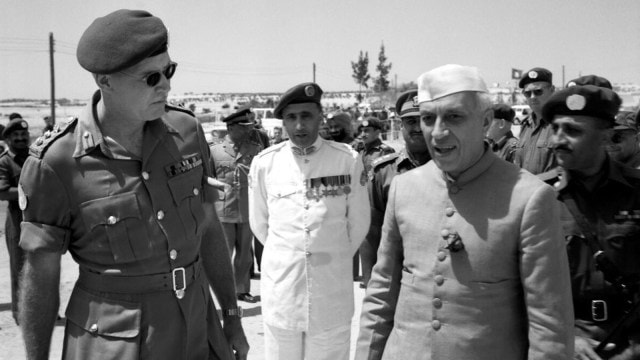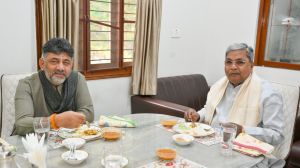Military Digest: When PM Nehru’s plane was intercepted by Israeli jets over Gaza
On May 19, 1960, there was an international incident when Israeli air force aircraft intercepted a UN aircraft carrying the Indian Prime Minister Jawaharlal Nehru who was visiting the UNEF in Gaza.
 Indian Prime Minister Jawaharlal Nehru on visit to UN Emergency Force (UNEF) troops in Gaza in May 1960. Nehru is seen here being greeted by Colonel ER Heuchan on his arrival at the UNEF Maintenance Area. Lieutenant-General PS Gyani, UNEF Commander, is seen between the two men. (Photo courtesy UN archives)
Indian Prime Minister Jawaharlal Nehru on visit to UN Emergency Force (UNEF) troops in Gaza in May 1960. Nehru is seen here being greeted by Colonel ER Heuchan on his arrival at the UNEF Maintenance Area. Lieutenant-General PS Gyani, UNEF Commander, is seen between the two men. (Photo courtesy UN archives) India has played an important role in the Arab-Israel peacemaking efforts of the United Nations. Gaza, the site of the ongoing conflict between Israel and Palestine, had a strong contingent of the Indian Army peacekeeping force under the aegis of United Nations Emergency Force (UNEF) from the 1950s till mid-1960s.
On May 19, 1960, there was an international incident when Israeli air force aircraft intercepted a UN aircraft carrying the Indian Prime Minister Jawaharlal Nehru who was visiting the UNEF in Gaza.
The UNEF commander at the time was Lt Gen Prem Singh Gyani, incidentally, the first Indian officer to be commissioned in the Regiment of Artillery. He also was the first Indian officer to command an Artillery field regiment. He remained the Commander of UNEF in Gaza from December 1959 to January 1964 before moving to another UN assignment in Yemen.
Nehru was visiting Gaza on his way back from the Commonwealth PMs’ Conference. In order to land in Gaza it was necessary for the UN aircraft to overfly Israeli territory for a short while. This was a standard practice for UN aircraft which flew into Gaza and the Israelis were in the know of this. No formal intimation was given in advance of any such routine flight. Since the impending visit of Nehru to the Indian military contingent was published in various newspapers in Arab countries and Israel, the Israeli authorities were aware of it.
The archival documents of the Ministry of External Affairs show that at the time of the flight two Mystere jet fighters of the Israeli Air Force intercepted the UN aircraft carrying the Indian PM. The Israel fighters flew, what one UN observer called, “dangerously close” to the Prime Minister’s plane and then withdrew. They are also reported to have flown twice near the Gaza airfield after the Prime Minister had landed.
The records state that as it was a United Nations plane that was involved in the incident and as the Prime Minister’s visit was arranged by the UN authoritles, the Government of India considered that it was up to the United Nations to look into the matter and refrained from expressing any opinion or taking any action.
The day after the incident, United Nations Secretary-General Dag Hammarskjold wrote to Jawaharlal Nehru explaining that the overflight of Israeli territory was technically necessary to enable the plane to land on the Gaza airstrip and that these conditions were well-know to the Israeli authorities. Hammarskjold deeply regretted the incident while pointing out that the United Nations personnel shared no blame for it.
Lt Gen Gyani had also written a report on the incident blaming the Israelis, in a rebuttal to which Israeli Prime Minister Ben Gurion made scathing comments on Lt Gen Gyani. The Israelis also claimed that four MIG aircraft were seen flying with the UN aircraft on the radar screens of Israeli military and due to this the Israeli aircraft had been tasked to intercept the aircraft. The Israeli PM also told the UN Secretary General that the Israeli Air Force had no knowledge of the occupants of the UN aircraft.
The UN Secretary General rejected the criticism of Lt Gen Gyani by the Israeli PM and instead wrote to Nehru mentioning the same and expressing appreciation of the spirit in which the Prime Minister had reacted to the incident.
The archives mention that according to Lt Gen Gyani’s report there was no UAR (as Egypt was called then) air force escort for the UNEF plane carrying the Prime Minister to Gaza and the four MIGs sighted on Israali radar were separately going to Al Arish airport.
“The Israeli excuses are quite evidently manufactured to try and put the blame on the United Nations. Since the UN had not formally informed the Israelis of the overflight and since the presence in the neighbourhood of UAR jets has given the Israelis a pretext for what they quite clearly knew was an unnecessary attempt at interception, there is little to be gained by pursuing this case,” the records state.







